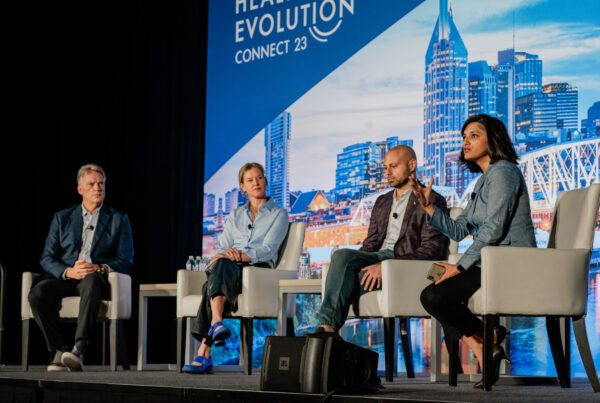Health Evolution is creating three new Work Groups within its Forum to identify and disseminate best practices that will drive change in health inequities.
Disparities have become increasing clear amid both COVID-19 and civil unrest, as has the need to improve community health among vulnerable populations to ensure patients have the opportunity to reach full health potential.
“It’s disquieting that we’re still having conversations in 2020 about real data collection to address health equity the way it should be addressed,” said Wright Lassiter, III, President and CEO of Henry Ford Health System, and a Roundtable Co-Chair. “Admiring the problem is completely insufficient and inappropriate. We need action to improve the health of the communities we serve. We need to lean in deeply and broadly to address health equity in a meaningful way.”
Payer, provider and life sciences CEOs as well as policymakers, thought leaders and other executives comprise the Health Evolution Forum in which Roundtables foster Work Groups. The Roundtable on Community Health and Advancing Health Equity ratified three critical initiatives that Work Groups will address:
-
- Leveraging Data to Improve Health Equity
- Building Scalable Models and Community Partnerships to Address Social Determinants of Health
- Increasing Diversity and Reducing Implicit Bias in Health Care Organizations
“This is an opportunity to make real impact. This is not about people sitting around and just discussing these critical issues,” said Pat Geraghty, President and CEO, GuideWell and Florida Blue. “It’s about how we collectively come together, take action and make meaningful change because the time is now and the environment we find ourselves in calls for action.”
Why now is the time to advance health equity
Efforts to reduce disparities among communities and within workforces have long been hampered by a lack of information relative to health outcomes by race across the health care system. By identifying best practices and bringing greater transparency to disparities, the Forum Work Groups will enable health care leaders to share and maintain information with which to build a workforce that is representative of the patient population.
“As we watch COVID-19 have a disproportional impact on our Black and Hispanic Latino communities, as well as the highlighting of racial inequities in our country, we as a health care industry need to meet this moment,” said Mandy Cohen, MD, Secretary, North Carolina Department of Health and Human Services, and a Roundtable Co-Chair. “There’s a lot of work to do here focusing on the actions we need to take.”
Health Evolution establilshed several other Work Groups, beginning with New Models of Care Delivery and Next Generation IT for Health Care.
A brief explanation of each Community Health and Advancing Health Equity Work Group follows:
Leveraging Data to Improve Health Equity. Many payer, provider and life sciences organizations have not segmented outcomes data by race and socioeconomic class to analyze the specific situations in which those disparities are occurring among their patients or members, Doing so is necessary to understand the breadth and depth of the disparities. The goal of this Work Group is to enable CEOs to identify, track and manage the impact of race on prevention and clinical care to inform strategies that address disparities at the member and patient population level.
Building Scalable Models and Community Partnerships to Address Social Determinants of Health. Health care CEOs are increasingly expanding their focus and interventions regarding social determinants. But identifying specific, evidence-based actions they can take internally has been challenging and such organizations have largely not sought to form meaningful partnerships with community organizations to reduce the total cost of care and improve outcomes. The goal of this Work Group is to identify scalable, replicable, and efficient best practices for establishing community alliances that CEOs can implement to address social determinants and drive down the total cost of care and improve outcomes for vulnerable populations.
Increasing Diversity and Reducing Implicit Bias in Health Care Organizations. The stark reality is that corporate leadership, including executive teams and boards, rarely reflects the gender, racial or other characteristics of employees, members or patients. While implicit bias leads to incorrect assumptions and suboptimal health outcomes, increasing diversity and reducing unconscious bias hold the potential to improve outcomes for all populations and reduce disparities. The goal of this Work Group is to reduce racism and bias within the health care community through greater leadership diversity and effective unconscious bias training.
The Work Groups will each disseminate learnings, best practices, recommendations and data that will be critical to increasing diversity in leadership positions, implementing effective unconscious bias training, forming community partnerships to intervene in social determinants, and more.
“There’s a tremendous amount of variability among all the different markets in terms of awareness of these substantial inequities,” said Chris Chen, MD, CEO, ChenMed, and a Forum Senior Fellow. “There are going to be tremendous learnings. It’s important for us to get those out there as much as possible because what we’re seeing is that it’s not always reaching local markets where health care really is determined.”
Critical cross-industry collaboration
Health Evolution Forum Interim Executive Director Brad Fluegel explained that the principal aim of the Work Groups is to ensure that the community itself can be active in helping advance equity, rather than making recommendations about how the government can or should fix these problems.
“We wanted it not to be policy-oriented, per se, but really collaboration that the community itself could drive even in the absence of dramatic federal or state policy changes,” Fluegel said.
Health Evolution Founder and Executive Chairman David Brailer, MD, added that each Roundtable has government leaders. “We are going to address hard things,” Brailer said. “We want to lead by example, and we know we can’t make progress nationwide without government support.”
There are also financial and business cases to be made: Taking what we know works someplace in health care and bringing that to scale, by the actions of the Forum Fellows making a commitment to both do so themselves and recommended that peers do so, will be more successful and cost effective than if individual organizations undertake the initiatives in a singular fashion.
“There are very few big problems in health care, including the one that is the focus of this round table, that can be accomplished by any one sector. It’s not like hospitals alone or health plans alone or doctors alone are going to make significant progress on this,” said Mark Smith, MD, Founding President, California HealthCare Foundation, and a Roundtable Co-Chair. “It is Health Evolution’s signature differentiating characteristic — the involvement of leaders from multiple sectors — that makes me optimistic we will be able to make progress here.”










